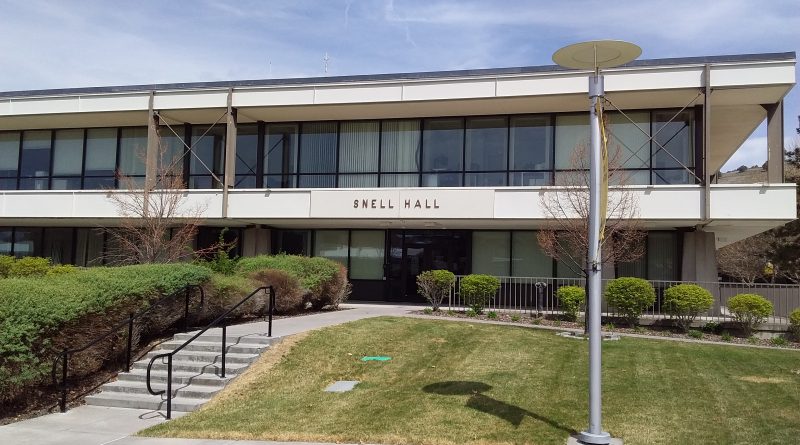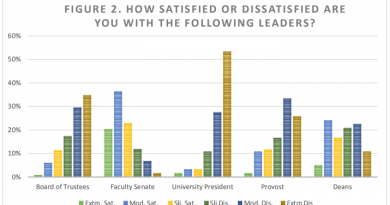Opinion: Oregon Tech can budget Over $500,000 for Snell Hall Renovations but not for fair faculty salaries
By Sarah Handyside, April 30, 2021
Klamath Falls, Ore.—Oregon Tech tuition is increasing along with overall revenue, yet faculty are underpaid and striking for fair wages. Where is the money?
On March 10, when Oregon Tech administration declared an impasse in negotiations with the faculty union, OT-AAUP, the university press release declared OT-AAUP’s compensation proposal “unrealistic” given the potential for cuts in state funding due to COVID-19. But just weeks before making that statement, Oregon Tech awarded ORW Architecture a $405,000 contract for an exterior renovation of Snell Hall, the administration building on the Klamath Falls campus.
Was Oregon Tech prioritizing Snell Hall over faculty salaries?
Snell Hall is Structurally Sound
On January 20, 2021, Oregon Tech’s Procurement and Contract Services posted a request for quotes on the website for Oregon Public Universities, seeking to hire an architectural firm to perform an exterior renovation of Snell Hall. According to the request for bids, the project has a budget of $405,000, but in the June 30, 2020, Oregon Tech Board of Trustees Finance and Facilities Committee minutes, the cost is listed as $561,730. In addition, Oregon Tech will pay the winning firm, ORW Architecture, $24,150 for design services.
According to Oregon Tech’s request for quotes, Snell Hall’s exterior renovation will include repainting, new LED lighting, and new exterior building signage, among other improvements. Much of the planned work is cosmetic. In 2004, the Department of Homeland Security Federal Emergency Management Agency (FEMA) funded a seismic rehabilitation of Snell Hall, meaning the building is structurally sound even in the event of an earthquake. During the seismic rehab, energy efficiency improvements, deferred maintenance and other modernizations were also made, according to a 2006 report from the Oregon Department of Geology and Mineral Industries.
Student Tuition Increases, Faculty Salaries Do Not
On March 10, just weeks after awarding the $405, 000 Snell Hall exterior renovation contract to ORW Architecture, Oregon Tech administration declared an impasse in negotiations with the university’s faculty union, OT-AAUP, declaring the union’s salary proposal “unrealistic.”
Faculty Salaries at Oregon Tech are below 87.5% of market salary rate, according to a Faculty Senate Report, and although Oregon Tech’s faculty compensation policy says faculty should receive an annual 2% wage increase called a cost-of-living adjustment (COLA), faculty have not received one since February of 2019.
At the time the impasse was declared, OT-AAUP was asking for retroactive COLAs as well as a $2.5 million salary increase in 2021, and similar increases in 2022 and 2023.
Oregon Tech administration said that, given economic uncertainty and possible cuts in state funding due to COVID-19, the faculty union compensation proposal displayed “a lack of situational awareness.” Retroactive COLAs and salary increases would cause significant tuition increases and a budget deficit.
The university’s 2020 Annual Financial Report says that although COVID-19 has impacted Oregon’s budget, the state has so far avoided funding cuts for Oregon Tech. The report also says total university revenue increased $3,552,000 between 2019 and 2020, and revenue from tuition and fees increased $2,559,000.
Tuition has been increasing for years according to an April 7 report from the Higher Education Coordinating Commission. Resident undergraduate tuition at Oregon Tech increased from $9,744 to $11,062 between 2012 and 2021. Adjusted for inflation, that’s a total increase of 13.5%.
The 2020 Financial Report says students get a great return on investment. New graduates earn average starting salaries of $60,000 per year, the highest average starting salary of any Oregon graduates.
“We also attribute this to our dedicated professors, who provide personalized attention and are genuinely invested in their students’ learning,” the Financial Report says.
Oregon Tech’s current faculty compensation policy says a full professor makes a minimum of $57, 301 a year, and according to the 2020 Financial Report, spending on instruction decreased $1,237,000 between 2019 and 2020.
The Problem with Oregon Tech’s Proposal
Ken Fincher, Oregon Tech’s Vice President of Institutional Advancement, said “Oregon Tech’s salary offer of a 13% increase, which includes a 9.5% guaranteed across the board salary increase with the potential for faculty members to earn an additional 3.5% or possibly more based on performance and promotion, is excellent.”
In an April 20 press release, OT-AAUP disagreed, saying “Administration’s proposals offer short-term wins at the expense of a fair long-term contract. Their proposed salary increases are phased out over the life of the contract in order to return to their proposed merit-only pool from 2023 onward.”
In a March 26 press release, OT-AAUP explained that merit-based pay systems don’t reward workers in proportion to their skill. Instead, a small pool of funds is set aside to reward those deemed worthy by the employer, forcing workers to compete against each other for a limited number of possible raises.
“The issue we have with merit-based pay raises is twofold: 1) admin decides what merit is, which leaves room for abuse, and 2) faculty compete over a pool of merit pay,” said Kari Lundgren, OT-AAUP secretary and Associate Professor of Communication. “This is the equivalent to telling a class that there are only three A’s available… And student #4, who worked just as hard, simply doesn’t get one. It’s not hard to imagine what issues of equity this might create.”
OT-AAUP’s compensation proposal “clearly outlines salaries for faculty at all levels and in all disciplines, based on compensation at other schools like Oregon Tech,” the March 26 press release said.
Funds Set Aside for Building Maintenance, Not Faculty Salaries
So, why is it okay to spend $561,730 on a cosmetic exterior renovation of Snell Hall during times of economic uncertainty, but “unrealistic” to ask for retroactive COLAs and salary increases?
“All universities have a maintenance schedule for what is called current or deferred maintenance, which includes, painting, wiring, plumbing, and upgrades to specific building codes,” Fincher explained.
The funds being spent on Snell Hall are designated for maintenance and upkeep of campus buildings and cannot be spent on other things, like faculty salaries.
“How would it look if faculty were enriched while your classrooms and labs or the safety of a building were questionable? How would we attract and retain students and faculty if our classrooms and buildings went unpainted and not maintained?” Fincher asked.
I get it. Funds set aside for building maintenance must be used for building maintenance. But faculty salaries are below 87.5 % of market salary rate, faculty haven’t received COLAs since 2019, and a full professor’s minimum salary is slightly less than that of a new Oregon Tech graduate.
It doesn’t look to me like faculty are being enriched.
Professors of Oregon Tech caliber simply deserve better pay. I doubt new signage on Snell Hall is going to keep them around in the absence of fair wages.
Oregon Tech’s revenue has been increasing. So has student tuition. The university managed to budget for building maintenance, so why didn’t they budget for fair faculty salaries?
The Oregon Tech faculty strike is now into its fifth day. Oregon Tech administration and OT-AAUP have been negotiating for over 550 days and will continue until an agreement is reached.




